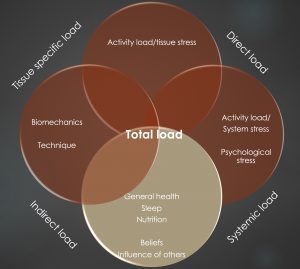This last post in the series will discuss indirect, systemic load, and like direct systemic load, will separate this into physiological and psychological.
PHYSIOLOGICAL
The factors we consider this bucket are sleep and nutrition. If a fighter lacks sleep, they will be under-recovered, have reduced capacity to tolerate training loads, and at a higher chance of injury. For athletes with busy lives outside sport with work, study, family, etc., who are struggling to fit in adequate sleep, training loads should be adjusted to allow optimal benefit from their training. Athletes struggling with sleep quality need to address their sleep hygiene and apply specific strategies to address this.
Nutrition is a huge factor for combat sport athletes, who are usually competing in weight classes and often are in a degree of caloric deficit. Again, training loads may need to be adjusted to account for this.
When injury occurs following changes in eating or sleep in the absence of other load changes, these should be carefully assessed.
PSYCHOLOGICAL
In this bucket we include factors such as beliefs and understanding, as well as relationships with others. Information provided by coaches, teammates and especially health practitioners can influence an athlete’s beliefs around their injury. As pain is essentially an alarm that is triggered in response to threat and/or perceived threat, any factor, including information that has the potential to raise alarm, has the potential to increase pain. Information regarding pain and injury needs to be presented in a way that does not increase this threat.
An athlete’s pain may be strongly related to their relationships with others. If one feels under extreme external pressure to succeed, then this may raise stress and anxiety levels. Athletes may also use injury as an excuse for poor past, present and future fight performance. These types of issues are best resolved with the help of a sports psychologist.
These posts have scratched the surface of the different types of load that may contribute to back pain. If you are a combat athlete with back pain, make sure that you, or the health practitioner helping you, is considering all these factors.
